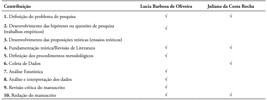Abstract
Purpose:
The aim of the study was to analyze individual and situational antecedents of work engagement. More specifically, we propose that engagement is influenced by individual differences, measured by a construct called core self-evaluations, by human resource management practices, and by leader-member exchange quality. Moreover, we investigate the relationship between engagement and turnover intention.
Design/methodology/approach:
The hypotheses were tested through multiple regression analysis with a sample of 299 professionals employed by public and private organizations of different sizes and sectors of the Brazilian economy.
Findings:
All hypotheses were confirmed. More specifically, work engagement was positive and significantly related to participants’ core self-evaluations, human resource management practices, and leader-member exchange quality. A negative and significant relationship between engagement and turnover intention was also found.
Originality/value:
Results showed that both HR practices and leader-member exchange quality can influence employee engagement, highlighting the importance of investments in these fields. Since engagement was also associated with individual differences, establishing an engaged workforce might require selection strategies that privilege employees who are more positive about themselves.
Keywords:
Work engagement; human resource management; leader-member exchange; core self-evaluations; turnover intention

 Thumbnail
Thumbnail
 Thumbnail
Thumbnail
 Thumbnail
Thumbnail


